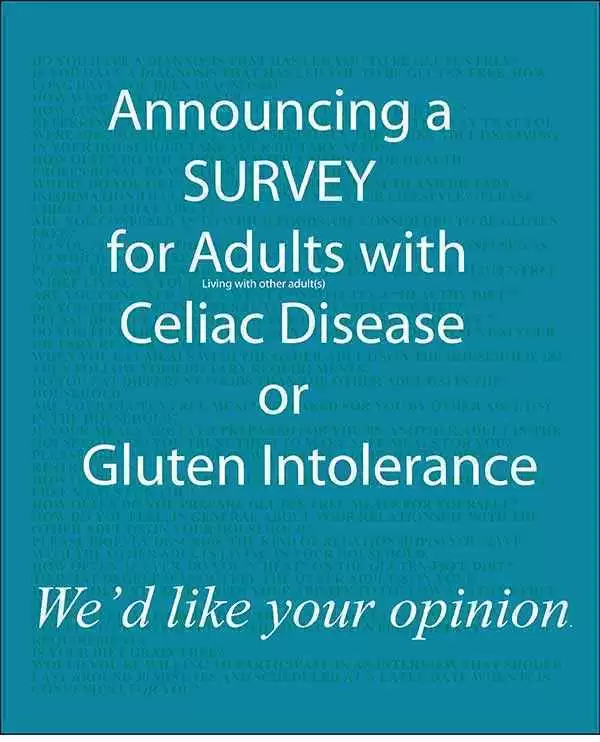
Celiac.com 04/21/2017 - Adults who have gluten sensitivities cohabitating with non-gluten sensitive adults may have a lot of unanswered questions that need to be asked. Dramatic changes in one family member's diet can have profound effects on a household (Bacigalupe & Plocha, 2015). Numerous studies document how parents and children handle everyday living when the child has food intolerances, but very few studies focus on adults living with food sensitivities. Wouldn't you like to know how other adults with food sensitivities adapt and manage over the long haul? Questions like: Does the person with the sensitivity live in fear of cross-contamination? Does the household employ methods to ensure s/he is safe? If so, what are those methods? Do the non-sensitive members of the household feel resentment? Or have they grown weary of compliance over the long haul? How adherent is the sensitive adult? Is it worth a little risk for a little pleasure once in a while? What do these cohabitating adults do to exist gracefully? These questions will be asked in a forthcoming study (on Celiac.com), and the results will be shared with viewers/readers.
Food allergies affect 15 million Americans (FARE, 2015), which means that adults with food sensitivities have gone from being rare to more commonplace as the population ages (Norling, 2012). Dietary restrictions due to disease will soon become common in many households and this can be problematic because severe dietary constraints are positively associated with diminished family social activities (Komulainen, 2010). Studies indicate that adults cohabitating, when one has food sensitivities and others do not, could potentially result in problems between members of the household creating feelings of uncertainty and potentially less adherence to the diet.
Celiac.com Sponsor (A12):
Regimented dietary requirements affect the quality of life when virtually every bite of food must be scrutinized before consumption. For some households, compliance may fall on the shoulders of the person who cooks. The cook in the household, caregivers, and everyone sharing the same kitchen, must be actively involved in protecting the person with the sensitivities keeping gluten-containing crumbs off the counter, out of condiment jars, thoroughly cleaning utensils, etc. (Crowley, 2012; Bollinger, 2005; Merras-Salmino et al., 2014). Of course, those living with sensitivities know there is a lot more to staying "clean and safe." Family members who share a home with someone with pervasive food sensitivities must express empathy to ensure harmony and compliance (Komulainen, 2010). However, compliance comes with a price -- every meal must be planned and cooked using alternative ingredients to avoid accidental ingestion. This takes diligence, education and ability to accomplish meal after meal (Jackson et al., 1985) especially when allergies are to ubiquitous foods such as dairy, soy, gluten or corn.
Dietary restrictions can cause misgivings on the part of the other family members, who may feel deprived of their favorite foods, compromised with recipe adaptations, or forced to unwillingly comply with the other person's diet. On the contrary, the person with food sensitivity may feel pressure not to comply with the diet in order to conform to the other adult's culinary demands. In the Jackson et al. study, forty percent of people with Celiac disease did not comply with the diet because it was too difficult (1985). The relationship between the cohabitating adults may be further complicated as trust issues develop between the sensitive adult and the cook, if the sensitive adult suspects foods that make them sick are creeping into their diet. Other food-sensitive adults report non-adherence because it is "too much trouble" and causes "social isolation" (Coulson, 2007). Non-adherence for those with sensitivities can lead to reactions, anaphylactic shock and even to death (Lee et al., 2003). Even those who do not react immediately risk long-term illness with non-compliance.
In my twelve years experience working with people in this arena, I have observed that dietary adherence in the household seems to go through phases. The first phase is what I'm calling the "transition" stage when a person is newly diagnosed, and everyone in the household is learning the new rules. The second stage is the "status quo" stage where cohabitants understand, and hopefully comply. Finally, the third stage is what I'm terming as 'turbulent' when other adult household inhabitants are feeling weary of compliance, may have doubts about the other's sensitivities, or even rebel. This stage may be triggered by an event that disrupts the "status quo", such as a holiday where traditional foods are expected, and where their gluten-free substitutions may not be as satisfying to the other household members. It may be triggered when the food sensitive adult decides they may be reacting to different foods than they thought before, and want to experiment with dietary changes. Dynamics between cohabitants may become turbulent during these times. After the event, the household adjusts back to equilibrium until the next triggering event, which throws them into a different part of this phase-cycle, where they may cheerfully welcome a "transition," or react with "turbulence." This cyclical pattern seems to continue as cohabitants move in and out of phases as life-events occur. One of the goals of this survey will be to determine the validity of this cycle.
I also want to test the hypothesis that a component of household compliance may also be associated with the status of the adult who has the dietary restrictions – whether the head of the home enjoys full household compliance, or if a subordinate adult must comply while others are eating the foods s/he are sensitive to. Another factor that may affect compliance is how the sensitive adult was initially diagnosed. Did a medical doctor conduct tests? Or did they read an article, and notice that they had symptoms consistent with gluten sensitivity and decide to go "gluten free?" Does the diagnostic process affect the compliance of the other adult members of the household? There are many factors that need to be assessed in order to help those of us who have food sensitivities who are living with other adults.
This survey/study will focus on family interactions when dealing with dietary restrictions, with the potential to increase family member's compliance. It will seek to gain insight on the impact food restrictions for one adult has on the rest of the family. This study has social significance because family unity in the future may rely on developing constructs for compliance to address this emerging social problem.
I'll collect data for this study and then share it with Celiac.com and the Journal of Gluten Sensitivity readers in order to create awareness by thoroughly examining the lifestyle of food sensitive people, shedding light on how social influences affect dietary adherence. As a PhD student at the University of Denver, and an adult with Celiac disease and a lifetime of other food allergies, living with another adult who has no food sensitivities, I know first-hand that it takes cooperation and commitment from everyone to ensure my health. I hope the study can help others improve their quality of life with the insight gained from conducting this study. I'll be launching this study on Celiac.com.
Thank you to Scott Adams for allowing this study to be conducted on Celiac.com.






Recommended Comments
Create an account or sign in to comment
You need to be a member in order to leave a comment
Create an account
Sign up for a new account in our community. It's easy!
Register a new accountSign in
Already have an account? Sign in here.
Sign In Now